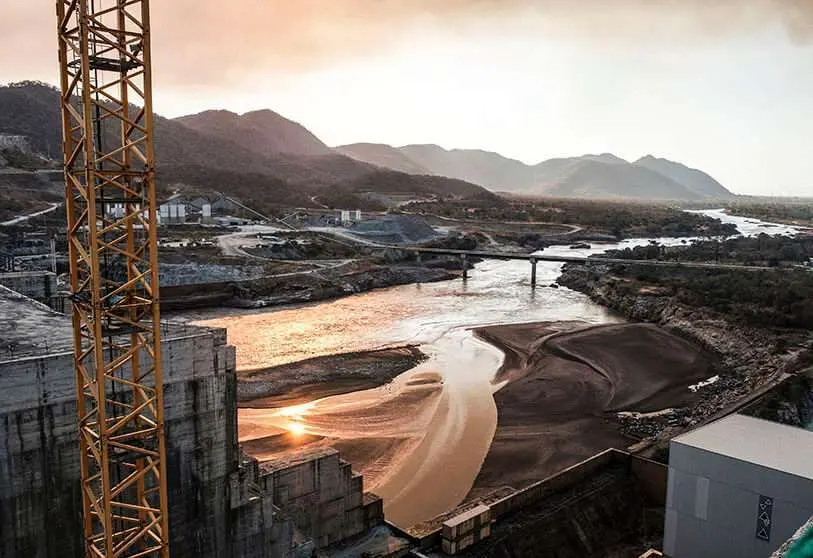Ethiopia, Egypt and Sudan continue to explore a possible agreement on the Grand Ethiopian Renaissance Dam

The latest meeting of the Assembly of the African Union (AU), held virtually because of the protection measures in the face of the health crisis of the COVID-19 disease, served to reactivate the negotiations between Ethiopia, Sudan and Egypt for the first filling and annual operation of the Grand Ethiopian Renaissance Dam (GERD), which affects the course of the Blue Nile.
The meeting was coordinated by Cyril Ramaphosa, president of the AU and South Africa, with the participation of the heads of state of Ethiopia, Sudan and Egypt and members of the Assembly of the African supranational body.
The leaders present pointed out during the meeting that the Blue Nile and the GERD are major continental issues that must be resolved soon. Those involved decided to grant official negotiating status to continue the dialogue on the dam, with the aim of moving towards a final agreement. Ethiopia, Egypt and Sudan agreed to conclude the negotiations and to make every effort to reach a joint understanding within the next two weeks, as was recently acknowledged in a formal statement by the Office of the Prime Minister of Ethiopia.
The East African country is scheduled to begin filling the dam through the flow of the Blue Nile River in the next two weeks, during which time construction of the infrastructure will continue, as set out by the Ethiopian authorities. It is precisely during this same period that the commitment to sign a pact has been announced.
The AU-sponsored meeting also served to notify the UN Security Council that the African entity is aware of the GERD treaty and also to request AU members to provide technical support for the negotiations on the infrastructure, urging Ethiopia, Sudan and Egypt to stop the latest escalation of fighting that had occurred at the diplomatic and media level on the issue in question.
Ethiopia, Egypt and Sudan will thus seek to consummate the agreement on the Grand Ethiopian Renaissance Dam, a process interrupted on many occasions by disagreements over Ethiopia's initiative to use the flow of the Blue Nile, considered to be basic, especially for Egypt, for its own benefit.

Politicians, media and the Ethiopian population are still waiting for the next steps to be taken by these nations in the next couple of weeks, regarding a dispute that, in its last stages, brought tension to the eastern side of the African continent.
Egypt had already appealed twice to the UN Security Council as part of a diplomatic escalation to spread its disparate position and the Council is expected to address the issue in the coming hours. The Cairo announcement comes after the failure of Sudan's initiative, which succeeded in relaunching negotiations in early June at the level of the three countries' water ministers, although the talks ended without an agreement and with many differences. The Sudanese country, which has recently leaned towards the Egyptian position, recently requested that the most controversial issues be dealt with at the level of prime ministers in order to reach agreement on the legal aspects. This has recently come to fruition with the latest summit held within the AU.
The summit between Ethiopians, Egyptians and Sudanese represented a step forward towards the resolution of outstanding issues, but there may still be disagreement between Ethiopia and Egypt in order to find an agreed solution without foreign intervention.
In any case, Ethiopia has indicated on several occasions that, even if they did not reach an agreement, it will comply with the phase of filling the reservoir planned to begin next July, while construction work on the structure continues.
For its part, the Egyptian State indicated that Ethiopia will not fill the dam unilaterally, without crystallizing a prior agreement, to which AU experts are summoned as observers.
For his part, the President of the AU Commission, Moussa Faki Mahamat, reaffirmed that more than 90% of the issues have been resolved and declared that he has confidence in the parties to bring the talks to a successful conclusion.
On the Blue Nile, the main tributary of the Nile located about 15 kilometers from the border with Sudan, Ethiopia began construction of the dam in 2011 and in 2014 began formal negotiations to regulate its filling and operation.
Several details cause dissension, especially between Egyptians and Ethiopians, but the main one is the time of filling the reservoir. Egypt aims to make it last 12 to 21 years, in order to protect its water supplies, and Ethiopia wants to achieve this in seven years or less.
For Cairo, GERD may affect its historic right to the Nile and limit access to this river source, which provides about 90% of its freshwater.
For Ethiopia, it represents the right to use its own resources in order to guarantee electricity and water supply to more than 50 million people, and also to promote the country's integral development.
The hydroelectric dam should be completed in 2023 and, according to official sources, it will generate such energy that it will become the most powerful in Africa; this will enable Ethiopia to export energy to neighbouring countries.








